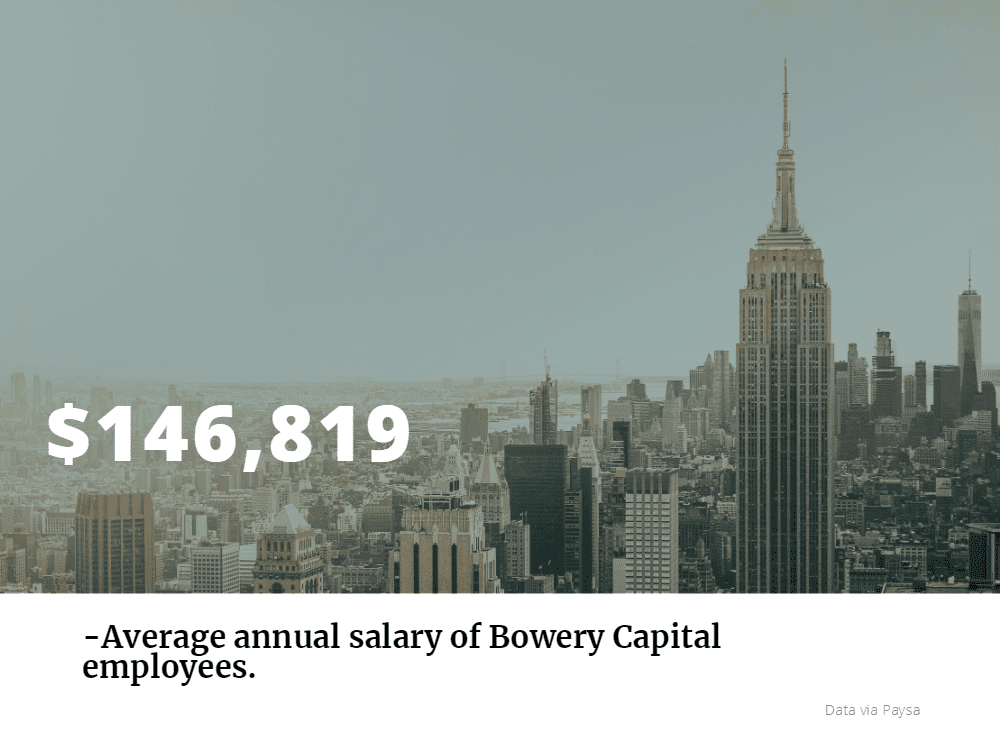Top MBA Recruiters: GlaxoSmithKline

GlaxoSmithKline (GSK) is a multinational pharmaceutical company headquartered in London. As for 2015, it’s the sixth-largest pharmaceutical company in the world with annual revenue of £30.821 billion in 2018.
The company is listed on the London Stock Exchange, and as of 2016, it was the fourth-largest company with a market capitalization around £81 billion. It has a secondary listing on the New York Stock Exchange.
Some of its top-selling products include Advair, Avodart, Flovent, Abreva, Lovaza, Lamictal, and Nicoderm. GSK also has many legacy products listed as essential medicines by the World Health Organization, including amoxicillin, mercaptopurine, pyrimethamine, and zidovudine. Continue reading…
Top MBA Recruiters: Bowery Capital

Founded in 2013, NYC-based Bowery Capital is an early-stage venture capital investor that primarily backs SaaS (software-as-a-service) B2B (business-to-business) startups that develop innovative software that allows companies to optimize the role of a continually changing technological landscape.
Bowery Capital is a relatively small firm with less than 50 employees and it has three groups of four individuals at the center of its operations. These groups are the Core Team, the Venture Partners, and the Revenue Council.
Bowery Capital doesn’t just invest in companies—it also provides them the right tools to succeed. It helps these companies build a customer base, provides them with a “robust software infrastructure” to enable growth, and offers crucial support in finding the right talent. This support coupled with the expertise of a combined 50 years of collective experience is what makes Bowery Capital stand out to young companies on the hunt for potential investors.
Landing a Bowery Capital Career
Considering the kinds of startups in which Bowery Capital specializes, any experience that a job applicant might have in software, digital marketing, digital media, online advertising, product management, or social media would give said applicant an edge in the hiring process. Another valuable asset is a keen sense for possible areas of growth within the tech industry.
It should be noted that at the time this article was written, there are no job openings at Bowery Capital. While the company does offer internships for MBA and undergraduate students, there appear to be no openings for those positions.
Working at Bowery Capital
Since the firm is relatively young and small, it is difficult to say much about Bowery Capital’s workplace culture. Its website lists a 12-member team and Glassdoor reviews from former employees suggest that Bowery Capital has a regular stream of interns working there on a part-time, short-term basis.

According to Paysa, Bowery Capital employees make an average annual salary of $146,819, with $97,852 marking the 25th percentile and $179,767 at the 75th percentile. However, this data does not indicate the average salaries by position, so it is unclear how much an employee who recently graduated with an MBA would make.
Life at Bowery Capital
Bowery Capital has not published any employee demographics or statements about their workplace culture, but all reviews from former employees on Glassdoor are overwhelmingly positive. In particular, they are nearly unanimous in their praise for a positive atmosphere and the expertise of their supervisors. The only con was from a former summer intern who mentioned that they had not been paid for their work at the firm.
Paysa also offers some helpful statistics on workplace demographics. Fifty-six percent of Bowery Capital’s employees are white, while the rest declined to offer this information. About 89 percent are male with the remaining 11 percent declining to disclose their gender. However, of the 12 team members listed on the company’s website, 5 are women. Additionally, the Paysa information is based on fewer than 20 users, so both of these data sets are in all likelihood only a small portion of Bowery Capital’s workforce.
Bowery Capital only has one office in New York City, but they invest in companies all over the country, especially on the West Coast, which as you may have heard has a thriving community of technological innovators.
While half of the Bowery Capital team is based in New York City, four are based in San Francisco and two are based in Boston. With this in mind, it seems likely that a Bowery Capital career would likely be based in New York City with potential opportunities for travel.
Top 5 Paying MBA Careers: Finance

Finance, no surprise, is an extremely popular field among MBA graduates. According to Payscale, finance is 4.7 times more popular among MBA graduates than other fields. The reasons for this are rather uncomplicated: its pretty lucrative.
The starting median salary for those with up to five years of experience is $62,100. After ten years, the reported median salary jumps to $120,000; a 93 percent increase. Given that it is finance, the bonuses that employees can earn are massive, making the field even more lucrative.
With such high salaries and the prospect of massive bonuses, those interested in finance might be curious about what the best positions are for them. These can vary by company, experience, and location.
Companies Recruiting Finance MBA Graduates
The firm you work for can affect how much you make. Larger firms tend to offer more than smaller houses. The following are the top five employers in terms of average salary for those with an MBA in finance.
Morgan Stanley: $136,500
Deloitte: $132,656
Microsoft: $123,684
Amazon: $123,678
Citigroup: $121,346
Finance MBA Experience
As one might expect, the more experience one has in a field, the higher their salary will be. According to Payscale, this is a breakdown of average salary based on years of experience.
- Up to 11 Months: $58,517
- 1–4 Years: $65,589
- 5–9 Years: $86,086
- 10–19 Years: $113,775
- 20+ Years: $135,016
Finance MBA Location
Along with company size and experience, location is the other major determinant of salary for finance MBA graduates. Given the fact that finance tends to be centralized in major cities, it is reasonable to assume that the largest salaries are to be found in cities with large, well-populated metropolitan areas. The following are the five cities where MBA graduates can earn the most.
- New York, NY: $120,962
- Los Angeles, CA: $111,727
- Boston, MA: $109,490
- Chicago, IL: $108,421
- Houston, TX: $101,643

For finance savvy MBA graduates, New York City offers the best average salary opportunities in the United States.
Top Paying Finance Careers
While there are many careers from which a finance MBA can choose, the following offer the highest salaries. To maximize a potential salary, one should consider the variables mentioned above when searching for a position.
#1: Vice President, Finance ($135,000–$195,000)
As a vice president of finance, your primary responsibility will be to direct finances and coordinate the budget. The VP of finance also sets goals and oversees lower-level employees in the financial department. Other responsibilities include engaging in accounting, operations, and finance management.
Common tasks include the following:
- Ensuring company financial plans are carried out
- Coordinating, preparing, and reviewing annual reports
- Directing accounting operations
The average salary of a VP of finance is $134,919. In addition, MBA graduates can earn an average of $24,430 in bonuses, $24,566 in commission, and $8,757 in profit sharing. The salary on this job can raise these numbers higher depending on where one works. Look for these positions in the following cities, where you can earn more than the average:
- San Francisco, CA: 28 percent more
- Los Angeles, CA: 16 percent more
- Boston, MA: 15 percent more
#2: Finance Director ($110,000–$160,000)
Finance directors are responsible for managing the goings on in the finance department of the company. In addition, effective finance directors can see problems and risks and design necessary solutions as needed.
Common tasks include the following:
- Overseeing the preparation of regulatory and financial reporting as required
- Developing policies and procedures to control and report financials
- Managing budget, forecast, and accounting preparations
The average salary of a finance director is $111,384. MBA graduates can expect to earn an average bonus of $18,556, $33,000 in commission, and $5,113 in profit sharing. According to Payscale, the following are three highest paying companies for this position:
- Nike: $150,000
- Lilly: $130,000
- CBRE Group: $128,000
#3: Investment Banker ($99,000–$207,000)
As an investment banker, your primary responsibility is to grow wealth for your clients. This can be through either strategic investing or raising capital. Investment bankers look through all of the financial information of a company to develop the best strategy for addressing its concerns and reaching its goals.
Common tasks include the following:
- Constructing financial models to aid in transactions and communications
- Performing valuation analyses
- Conducting industry and company research
On average, you can expect to earn an average of $98,831 in salary. Investment banking is rather lucrative, so it is not impossible to double your salary in commission alone. However, because if this, the salary scale can widely vary. The average commission for this position on Payscale is $90,000. To make that possible, you’ll need to go to a city where capital generation is needed. These three places pay more than the average, according to Payscale:
- San Francisco, CA: 52 percent higher
- New York, NY: 12 percent higher
- Dallas, TX: 5 percent higher

Investment bankers would do well to look into a career in the Bay Area. San Francisco-metro investment bankers make nearly 50 percent more than the national average, according to Payscale data.
#4: Finance Manager ($90,000–$124,000)
Finance managers are expected to watch departmental budgets. Their primary responsibilities include making financial forecasts for their company, working with other departments to establish future budgets, and keeping excellent track of the money going in and out of the company.
Common tasks for people in this position include the following:
- Identifying areas for cost reduction
- Providing analyses to the operations team
- Preparing informational analyses
Given the importance of this position, MBA graduates who pursue it will be compensated well. The average salary for a finance manager is $89,636. In addition to the base salary, an MBA graduate can expect an average of $9,959 in bonuses, $25,006 in commission, and $3,982 in profit sharing.
Because this position is so important, companies are willing to pay excellent candidates well. The following offer the three highest average salaries according to Payscale:
- Boeing: $119,000
- Amazon: $112,000
- Johnson & Johnson: $111,000
#5: Portfolio Manager ($84,000–$140,000)
Portfolio managers are responsible for investing their clients’ money, whether those clients are businesses or individuals. They work to get the highest return possible for their clients’ money.
Common tasks for this position include the following:
- Consulting with clients to develop investment goals
- Reporting on investment performance
- Managing portfolios to maximize returns
Portfolio managers earn an average of $84,443, with $10,274 in bonuses, $10,113 in commission, and $4,000 in profit sharing. According to Payscale, these positions tend to be centered in financial institutions and investment firms.
The following three banks offer the highest average salaries to their portfolio managers.
- Blackrock: $115,000
- S. Bank: $99,000
- Citizens Financial Group: $97,000
The Top U.S. Entry Level Jobs and Internships of 2019

While work life balance, benefits, growth potential, and job security all factors to consider in your job search, the fact is that base compensation is more than likely the high priority. Getting an MBA is a sure way to increase earning potential, but where should you begin to look for the best internships and entry level jobs in such a vast and competitive playing field?
Glassdoor recently published its report on the highest paying internships and entry level jobs of 2019. We’ve broken down the report to help our readers discover just which of these positions and companies can offer them the best places to put their MBA talent to work.
Top 5 Entry Level Jobs for MBAs
One of the many pieces of good news from Glassdoor’s report is that as the number of tech jobs continue to increase, so does the need for business minded workers. This, along with the fact that finance and consulting positions follow right behind tech on the highest paid jobs list, should make b-school students optimistic for their prospects.
Product Manager
Product Management is a key role for any organization in the business of turning ideas into profit. According to blogger Dan Driscoll, who wrote a definitive article on the role, PMs are “closet-creative types with an ambitious acumen for business fundamentals and priorities, as well as masters of persuasion and consensus-building.”
Strong analytics skills along with a creative approach to problem solving are key for these positions. Engagement in design, development, support and marketing are all features of this role, which has a median base salary of $89,000 to start.

Major firms, such as Salesforce, are currently looking for top-tier product management candidates.
Investment Banking Analyst
Financial modeling, business valuation methods and strong presentation skills are just a few of the factors that comprise the Investment Banking Analyst role. The nuts and bolts of finance firms are the responsibility of the investment banking analyst, as they track live transactions along with M&A and private equity transactions.
At a starting median base salary of $85,000, this job is a great foundation on which to build a career.
Implementation Consultant
Implementation, according to coaching and recruiting site Firm Consulting, is one of the three main branches of consulting as a whole. Implementation teams take recommendations from Strategy and Operations consulting teams and turn them into realities. For instance, a company may be deciding to create a new division. Strategy and Operations consultants determine how best to profit from this, and implementation consultants make it happen.
ICs brand, execute and set up the division in this scenario, including relocation if necessary, along with on-boarding procedures. The starting base pay for ICs is $72,000.
Actuarial Analyst
Actuarial Analysts, who make a starting median salary of $66,250, are the workhorses of the insurance industry. Using statistical models, they analyze the probability and cost of various events (injury, accidents, and product failure, for example), and use this data to determine insurance policy pricing. Certification by either the Society of Actuaries (SOA) or the Casualty Actuarial Society (CAS) is required for these positions.
Actuaries must pass seven exams for the CAS and five in the SOA. This generally happens within a four-to-six year period, but students can begin the test while still enrolled in school. After passing the first and second exams, a student can start their first job. The ‘fellowship’ level of certification takes place over an additional two-to-four years.
According to the U.S. Bureau of Labor Statistics, the role of Actuarial Analyst has a 22 percent growth rate projected up to the year 2026.
Business Analyst
Business Analysts are key team players who make certain that companies’ current systems are as efficient as possible, and who develop strategic plans for growth. As agents of change, Business Analysts identify growth opportunities and reduce costs during these changes. Business Analysts work closely with IT departments to ensure that the best technologies are in place, and they also serve as a link between different departments of a company to ensure consistency.
Therefore, communication, diplomacy and a strong understanding of each business function are vital to success in this role. The four major components of development, modeling, process design (workflow creation), and systems analysis are the basic elements of the Business Analyst role.
To start, Business Analysts make a median salary of $63,000.
Top 5 Highest Paying Internships
Facebook leads the pack in paying its interns $8,000 per month, followed by: Amazon at $7,725; Salesforce at $7,667; Google, which pays $7,500, and Microsoft, offering interns $7,250 monthly.
Facebook tops Glassdoor’s 2019 ranking of the top-paying U.S. internships, with interns pulling in an estimated $8,000 per month
Each of these companies have highly competitive university recruitment programs. For details, see Facebook Careers, Student Programs at Amazon, Salesforce University Recruiting, Google Student Internships and Microsoft University Internships.
Those graduating now or in the near future from MBA programs have a solid advantage in today’s market; job growth is high in the U.S. and unemployment is low. While these high paying jobs and internships are clearly appealing for a reason, keep in mind that more intangible factors like company culture and proven trust in management are the things that will sustain you regardless of salary.
Penn State Smeal Director of Admissions Answers 5 Burning MBA Questions

In our latest installment of the MetroMBA “5 Questions” series, we speak with Michael Waldhier, the Director of Admissions at Penn State University’s Smeal College of Business. Waldhier talks about the close-knit, collaborative community at Smeal, his alumni experience, and the many activities, clubs, and opportunities available for students. He also shares about the 150-year-old Penn State Berkey Creamery—excuse us while we go grab some ice cream!

Michael Waldhier, Director of Admissions at Penn State’s Smeal College of Business
1. What is the Smeal College of Business’ greatest asset and what do you wish MBA students knew more about?
“Rather than discussing our #1 ranking in supply chain management or the fact that Penn State has the largest active alumni network in the country, I honestly think our greatest asset is our class—specifically the individual, tightly-knit, collaborative atmosphere that exists in our MBA program. We only accept 60 students per year in the resident MBA program, which allows for an unparalleled amount of interaction within the cohort, and ensures that faculty and staff build strong, personal relationships with everyone in the class.”
2. What makes the Smeal College of Business a special place for you?
“In addition to being Director of Admissions, I am also an alum of the Smeal MBA program, and remain extremely close to most of my classmates and many of the professors who still teach in the program today. After graduation, I was fortunate to land a principal role in strategy consulting and had the wonderful opportunity to travel extensively over the course of my career. When it was time to transition to something new, returning to Penn State, to ‘Happy Valley,’ and to Smeal was an easy decision for my family to make. This program had an enormous positive impact on my life and set me on the path to success, and I can’t think of any better way to pay it forward to future generations of Smeal MBAs than to be where I am today.”
3. How would you describe the culture of the Smeal College of Business? Is it more collaborative or competitive?
“As mentioned, given the small size of our MBA community and the amount of teamwork that is required throughout the experience, our program is extremely collaborative, so much so that students often help each other to broaden networks, land internships and jobs, and even study for exams. We put a lot of emphasis upon collaboration and teamwork, and students will recognize each other for positive contributions to the program that are aligned with the Penn State Values of integrity, responsibility, excellence, respect, discovery, and, of course, community.”
4. How does Smeal help MBA students pursue their special interests?
“While the MBA program itself may be very small in size, Penn State University is one of the largest in the nation, and there are activities and special interest clubs and groups for virtually everyone. Within the MBA program, we have numerous clubs and associations for students to join such as the MBA Association, Consulting Club, Net Impact, Finance Association, Military and Veterans MBA Association, and more. In addition, students have access to courses across the university if they want to explore a topic outside of the core Finance, Marketing, Supply Chain, and Consulting concentrations. To that end, we have packaged optional programs of study in nearly 20 topic areas, with more being added each year. This allows students the flexibility to customize their MBA experience and pursue just the right mix of coursework to satisfy any career or personal interest.”
5. What is your favorite part of the Penn State campus?

“There are a plethora of wonderful hiking and biking trails in the mountains surrounding Penn State, but the Arboretum is a special place where one can walk through gardens inspired by cultures across the world and study or relax amidst fountains and koi ponds,” Waldhier says.
A lot of people will talk about the Penn State Berkey Creamery, which has been making ice cream for over 150 years, or Beaver Stadium, one of the largest college football stadiums in the United States, but one of my favorite places on campus is the Penn State Arboretum. There are a plethora of wonderful hiking and biking trails in the mountains surrounding Penn State, but the Arboretum is a special place where one can walk through gardens inspired by cultures across the world and study or relax amidst fountains and koi ponds. It also helps that it is right next door to the Smeal College of Business, so students frequently go there after class for team meetings or to relax and unwind after a stressful day.”
Company Battle: Morgan Stanley vs Credit Suisse

MBA graduates on the prowl for post-graduate employment opportunities would do well to investigate international banking giants Morgan Stanley and Credit Suisse, both of which offer many attractive perks to employees.
New York City’s Morgan Stanley primarily handles the investments and assets of governments, corporations, and institutions. Zurich, Switzerland-based Credit Suisse is highly regarded for its bank-client confidentiality and overall discretion with regard to client information.
Morgan Stanley vs Credit Suisse: Salaries
The most common entry-level position for MBA graduates is as an associate. Luckily, associates are compensated handsomely at both companies.
Morgan Stanley offers an average salary of $108,659 according to Glassdoor data, with the possibility of an additional $21,732 in bonuses, on average.
Credit Suisse remains competitive with Morgan Stanley at an average annual salary of $111,572 and an average overall pay of approximately $112,000. However, there is the potential for healthier bonuses at Credit Suisse, with a ludicrous average bonus pay of $67,980. Still, reviews from current and former Credit Suisse employees on Glassdoor seem to suggest that bonuses are actually few and far between. Whereas reviews from Morgan Stanley employees suggest that they are more generous.

Morgan Stanley vs Credit Suisse: Company Culture
Credit Suisse and Morgan Stanley actively fosters inclusion in the workplace, with a number of key diversity initiatives. In addition, both banks have implemented innovative strategies to demonstrate corporate responsibility and philanthropy.
Credit Suisse offers several employee networks designed to foster collaboration, including networks for family, women, veterans, LGBT professionals, and POC professionals. Additionally, Credit Suisse offers the Real Returns™ Program, which offers senior bankers the chance to return from an extended career break.
Morgan Stanley also encourages their employees to volunteer regularly, as exemplified by its Global Volunteer Month, the most recent iteration saw 48,000 employees in 36 countries volunteer over 262,000 hours of their time.

Morgan Stanley’s Vice Chairman Tom Nides and Chief Human Resources Officer Jeff Brodsky, shown with over 300 volunteers during the company’s 2018 Global Volunteer Month.
Credit Suisse is known for its collaborative working environment and flexible working hours. Morgan Stanley, on the other hand, promotes a supportive workplace culture, but work occurs at a much faster pace and over longer hours. Some might find the fast-and-furious approach preferable, as it offers more learning opportunities, but it can be difficult to maintain a healthy work-life balance.
Both banks rank highly by various publications on workplace cultures, but Morgan Stanley seems to consistently come out on top. According to Vault, Credit Suisse ranks at 19th as the best place to work, whereas Morgan Stanley comes in 4th. eFinancialCareers also ranks Morgan Stanley as the 4th most ideal employer, citing its competitive bonuses and salaries, as well as its progressive initiatives on issues like workplace diversity and corporate social responsibility. Despite their attractive salaries, positive office environment, and accommodating working hours, Credit Suisse comes in slightly behind at 10th. Finally, Glass Door ranked Morgan Stanley at 100 overall in its 2019 list of ‘Best Places to Work.’
Morgan Stanley vs Credit Suisse: Hiring Rates and Versatility
Morgan Stanley features over 57,000 employees, spread out over 41 countries. There are opportunities to work in North America, Europe, the Middle East, Africa, Japan, and Asia Pacific.
Credit Suisse features 46,840 employees working across 50 different countries. However, a number of positions are only available in Switzerland. In spite of these figures, Credit Suisse claims that there are still many opportunities for mobility, both internally (with respect to opportunities to work across departments as well as potential promotions) and geographically. In 2017, 4,100 employees made an internal move and 47 percent of vacancies were filled internally.
